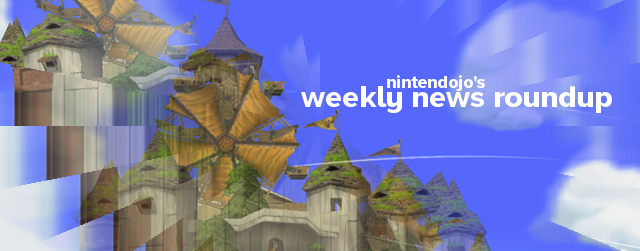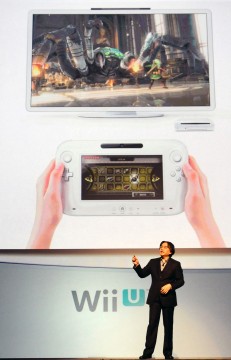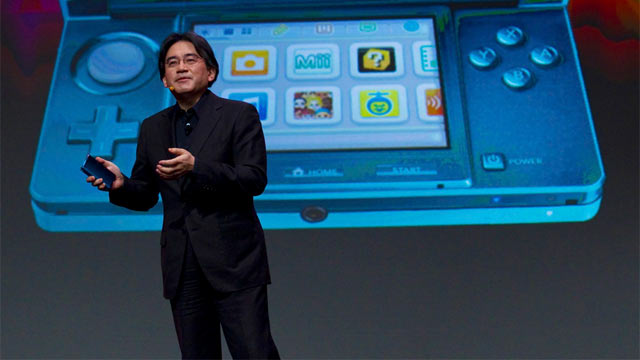
CliffyB, EA, presumably others excited for Wii U
I know a bunch of us may be tired of hearing about Wii U already (hopefully not– it’s not even out yet), but Epic Games director CliffyB and EA CEO John Riccitiello sure aren’t. In fact, both of them have exceedingly nice things to say, mirroring what id Software of all companies had to say about the polarizing console. Here’s a quote from a Riccitiello interview with IndustryGamers:
“It’s a high definition platform and I love the controller. I just think it’s cool. You’re a gamer – so you’ve got the screen here [in your hands] and you’ve got the [TV] screen there and you’ve got full control. Personally, while there’s some great experiences on Move, and there’s some great experiences on Kinect, I’m not a motion control guy. It’s still too imprecise for me. I like shooting something and hitting it. I like turning a corner and feeling precision. So I still like my swizzle sticks and my shoulder buttons and my Xs and Os, etc. But there is something about having that second screen that transcends anything I’ve ever done before,” he enthused.
Riccitiello continued, “I can draw a pass pattern for Madden, I can be playing an FPS up here while I’m calling in air strikes or whatever I want to do. I can give all the detailed control off the screen, I can see another part of a map… I always find it breaks the spell for me when I’m playing a game with a squad and I have to stop the action and move up for them. Now I can just move them down here [on the tablet]. I think there’s something really powerful about a second screen that I think really matters. I think we’re just beginning to realize what we can do with it and I think it’s obvious we can do a lot with it.”

Meanwhile, from another interview with famously candid CliffyB:
He commented, “From what I’ve seen, it looks pretty cool. It seems like you can stream your game from your television directly to your [tablet] controller, so if you have irritable bowel syndrome, or a small bladder, you can still play it in the toilet. That’s great. But, you know, from what people are saying online, they’re like, ‘Oh, it’s just a DreamCast, whatever.’ But it’s like, ‘Dude, what’s old is new sometimes.’
“The Power Glove [back on NES] led to the Wii, right? The Virtual Boy led to the 3DS, right? A lot of these older technologies that you forget about are [the technological predecessors]. The Kinect is a sophisticated webcam, right? So I’m just dying to see it. It’s Nintendo. I’ll buy it. I know I’ll buy it. They’ll talk sh*t but they’ll buy it,” he added, referring to the skeptical gamers on message boards.
While Electronic Arts has already committed to Wii U releases– Riccitiello even showed up at the E3 2011 conference to give his very positive thoughts onstage– Epic Games has never released a game on a Nintendo platform. Mark Rein of Epic previously stated that Epic would release games on Nintendo platforms if they were up to its technological standards, though, so Epic releases for the Wii U seem at least possible by this point.
Finally, Brian Martel, chief creative officer of Gearbox Games– makers of such recent hotsellers as Duke Nukem Forever and Borderlands, wondered if it could be possible to establish a HUD-less environment for Wii U games, transferring the HUD directly onto the tablet controller. Martel further noted that the Wii U was “a lot more capable for hardcore first-person shooter-style gaming”, and thus “fantastic” for companies like Gearbox.
Source: IndustryGamers, IGN UK
Iwata Answers: Mature games, value of video games
At the 71st Annual General Meeting of Shareholders Q&A, Nintendo of Japan head Satoru Iwata took a break from asking and instead answered some rather compelling (or whiny) questions from shareholders, including topics on everything from mature video games to social predispositions toward video games– as well as why the development time for 3DS was so long. While the entire four-page article is a good read, especially Iwata’s response to a shareholder’s query about whether Nintendo’s focus on casual “social games” is really such a good idea financially, here are two comments regarding Nintendo’s stance on video games’ place in society:

Satoru Iwata giving the keynote at the Game Developers’ Conference in 2010.
Q5-1: I own some shares but I do not have any Nintendo products. Basically, I think “Games are a waste of time” and, therefore, I would like a product that has value added to it so that even I would buy one. As for the Nintendo 3DS, if I were to buy it for my child, there should be no negative factors. There needs to be value added to dispel any negative factors. I think parents will not buy it unless there is value added, for example, the display of this game console is easy on the eyes so it is less harmful than displays of other game systems or mobile phones, or adding mobile-phone functionality so that just having the Nintendo 3DS will enable gameplay and take on the role as a mobile phone and, therefore, parents could contact their children as long as that child is carrying his or her Nintendo 3DS.
A5-1: Iwata: First, regarding your comment that “Games are a waste of time,” I think it depends on the individual, but I believe Nintendo is present today because there are many people who do not think so. Certainly, the situation where “games = playing alone in a room” is often discussed by society very negatively and even now, although I feel it has improved quite a bit, I really want to somehow change the situation where, for example, if there is a criminal act by a teenager, there are opening reports such as “The suspect was a video game player.” This is something I mentioned earlier today, and we call it “social acceptance,” but there are less people who consider video games to be a form of entertainment that they acknowledge and enjoy to the same degree as movies or TV. Through our activities, I think the level of acceptance has risen, but we still have a long way to go. Therefore, your comments, “I think games are a waste of time” and “I want something that an adult like me would want to play” is part of our goal, which is to “expand the gaming population,” and raise the social acceptance of video games and, therefore, we would like to continue to move towards that goal.
Also, there are many discussions of adding various value functions, not just for the Nintendo 3DS. By proposing elements to help change the ways of using the TV in the living room, for example, which was one scene in the Wii U clip that I showed earlier, being able to make video calls easily with someone far away, surf the Web or move something interesting from the Web from the controller to the TV screen, we envision a future where the Wii U controller will be regarded as something which relates to even family members who aren’t interested in games.
In addition, if we had never considered combining a mobile phone and a handheld device, we would be negligent, but on the other hand, mobile phones are subject to monthly fees and we need to consider how well this would fit with game devices or how we should balance these aspects. Adding to this, mobile phone companies are generally divided by countries and when running a business on a worldwide basis, we need to consider in what conditions can we partner up with mobile phone companies around the world. Please understand that we are still researching these areas.
Here Satoru Iwata addresses what we see constantly in the mainstream media and what has since garnered its own Wikipedia page, not to mention a certain recently covered Supreme Court case in the United States. While it’s certainly not pleasing to hear that the same sentiment lasts overseas, it’s good to hear that Iwata, as president of Nintendo of Japan, seems concerned. Even if it is primarily out of financial need.
Source: Nintendo of Japan
Dylan Cuthbert returns for Iwata Asks
True believers will remember Dylan Cuthbert from the original Star Fox for the Super Nintendo– at the age of eighteen, Cuthbert packed a Game Boy 3D demo and headed for Japan, where he found an audience with Shigeru Miyamoto (and about thirty employees) with this apparently-impressive demo. Nearly two decades later, Cuthbert’s almost all but disappeared from the public eye; Cuthbert left Argonaut Software to found his own company, Q-Games, which has since developed a number of tech demos, as well as bit Generations: Digidrive and Star Fox Command. Nevetheless, Cuthbert’s returned to the Kyoto offices for another installment of Iwata Asks, for now untranslated. Among other information garnered, Cuthbert and Miyamoto revealed that they developed a language exchange program of sorts alongside Star Fox: Miyamoto would speak to Cuthbert in English and Cuthbert to Miyamoto in Japanese, to improve each other’s diction. (Miyamoto, AndriaSang reports, apparently had trouble with his prepositions.) Furthermore, there’s some discussion of the ill-fated SNES sequel Star Fox 2, which has since seen the light of day only in prototype form.

Dylan Cuthbert with Shigeru Miyamoto for Nintendo’s Iwata Asks article series.
As for what Cuthbert’s doing nowadays, Q-Games has been developing Star Fox 64 3D— set to be released in July in Japan and September in Europe and North America– as well as much work for Nintendo;’s DSiWare and Sony’s PixelJunk series. While Cuthbert spends much more time on other projects than Mr. McCloud’s franchise now, with any luck, Star Fox 64 3D is a sign of more things to come from one of Fox’s original creators.
Source: AndriaSang
Bonus Content
– Dungeon Man translation comparisons in MOTHER 2 and EarthBound
– DarkSiders II team discuss Wii U development
– Japanese software sales
– Resident Evil fans interview D.C. Douglas, last voice of Albert Wesker
– Ocarina of Timepieces




 ShareThis
ShareThis






